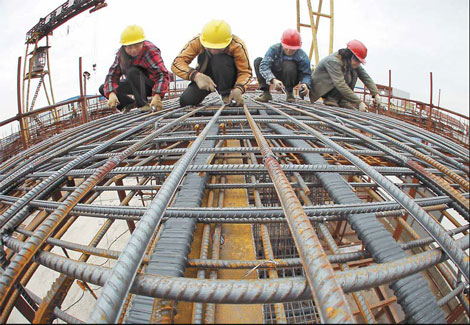Economy
CISA urges stockpiles of iron ore reserves
Updated: 2011-02-25 07:52
By Zhang Qi (China Daily)
|
Workers constructing a steel-structured bridge in Shanghai. The steel industry lobby has urged the government to use its foreign reserves to stockpile iron ore supplies. Xu Congjun / China Daily |
Industry group says nation must not be held to ransom by companies
BEIJING - China's steel lobby, the China Iron and Steel Association, on Thursday urged the country to build strategic resources stockpiles by using the foreign exchange reserves.
"China should change its large foreign exchange reserves into resources reserves, especially precious ones," said Luo Bingsheng, former vice-chairman and current special consultant to the steel association, at a conference on Thursday.
"Like oil reserves, China should also have iron ore reserves. Large amounts of ore can be bought when prices are relatively cheap to guard against a monopoly from global mining companies," he said.
Luo said China has obtained 150 million tons of iron ore mining reverses in overseas countries and should speed up the pace of overseas ore investment to secure supplies. He also urged steelmakers to seek 40 percent of iron ore imports from Chinese-invested resources, such as mines, by 2015.
The global supply of iron ore might be tight in the first half of this year, but will ease in the second half, he predicted.
The spot price of 62-percent ore content iron ore at Tianjin port rose to $191.9 per ton on Feb 16, the highest level since November 2008, according to the Steel Index.
"Domestic ore production increased 21 percent last year, and if domestic output can keep the growth rate, I am sure that this year's ore imports will decline or remain at last year's level," Luo said.
China imported 617 million tons of iron ore in 2010, down 1.4 percent from the pervious year. That was due to lower supplies from the big miners - who sold a proportion of ore to the European market that has recovered from the economic crisis - and on increased domestic iron ore production which was propelled by surging import prices
Luo also said that discussions on iron ore contracts are not held between a representative of steelmakers and miners anymore, but have become a series of negotiations between individual miners and steelmakers.
Keith Tan, associate editor in Platts Metals Group, said: "Iron ore contracts are now bilateral agreements between a miner and a steelmaker, and prices are determined by indexes rather than negotiations."
"Negotiations still take place, but on the fine contractual details rather than actual prices, for example, on freight price," he said.
The big three miners - BHP Billiton Ltd, Vale SA, and Rio Tinto Group - currently offer free-on-board (FOB) prices to Chinese steelmakers, while the world's major three iron ore indexes are used to calculate CFR (cost, freight) prices.
However, Vale and Rio are still using quarterly pricing, which is based on the average market price over the previous quarter, minus one month, according to Platts.
China Daily
(China Daily 02/25/2011 page13)
Specials

Kremlin buddies
Dmitry Medvedev and Vladimir Putin inspect Olympic preparations.

Lantern Festival
The Lantern Festival is celebrated across China.

New York Fashion Week
Models line up before a show during New York Fashion Week.
